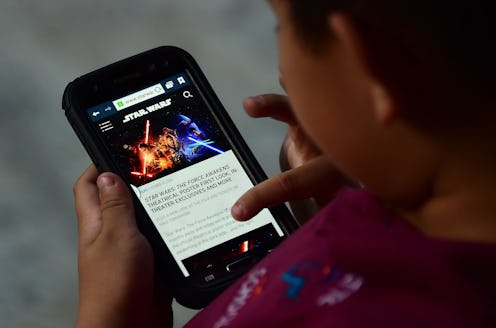News
Teens Spend Nine Hours A Day Consuming Media
If you know any teenagers, it might seem like they are glued to their tablets, laptops and other devices. Apparently, that's because they are. The average teenager spends more time consuming media than doctors recommend we sleep, according to a new report by Common Sense Media. Nearly nine hours! These 13- to 18-year-olds apparently spend that time updating social media, browsing the Internet, listening to music, reading print media and watching TV, movies and online videos — and that excludes any time spent at school or for homework, according to the report.
This data comes from a new report by Common Sense Media, a nonprofit dedicated to helping parents, teachers and politicians ensure that media and technology has a positive effect on children. Tweens, aged 8 to 12, also consume a lot, about six hours a day. Of those respective nine and six hours, more than two thirds is spent in front of a screen of some sort, be it a smartphone, tablet, TV, or computer. The study was based on a sample of more than 2,600 young people.
James Steyer, chief executive officer and founder of Common Sense Media, told CNN that the volume of media kids are exposed to is "mind-boggling." "These kids live in this massive 24/7 digital media technology world, and it's shaping every aspect of their life. They spend far more time with media technology than any other thing in their life," he told CNN. Steyer said there are many aspects of the study that shed light on how media is reshaping childhood and adolescence.
Multitasking Helps?
Most teens multitask while doing their homework, according to the report, and they don't think it affects the quality of their work. The study said that about 50 percent of teenagers watch TV or browse social media while doing homework. Another 60 percent text and 76 percent listen to music. The majority don't think this negatively affects their work and, with regards to music, about half even thinks it helps them with their work.
Richer Kids Have More Access To Screen Time
Lower-income families aren't as likely to have a laptop or high speed internet at home, limiting screen time for those kids. Some 62 percent of upper-income kids have their own laptop, while only 25 percent of lower-income students do. In fact, only about half of poorer households have a laptop for the family to share.
Consumption, Not Creation
Evidently, not every kid is on Tumblr. The study looked at what teens and tweens do while using computers, tablets, and smartphones to differentiate time spent consuming, watching video, reading or listening to music; interacting, playing video games or browsing the web; communicating, using social media or video chat; and creating, which would be writing or creating digital art or music. Only three percent of the time these kids are creating. A quarter of their time is spent on communicating and another quarter on interacting. About 40 percent is spent consuming.
Social Media Is Not King
Just 10 percent of teens chose social media as their favorite activity. About 45 percent check their accounts on a daily basis, but more kids watch TV or listen to music everyday.
Boys Are Still The Majority Of Gamers
Boys like video games more than girls do. Of all teenage boys, 27 percent list video games as their favorite media activity, while only two percent of girls do. Boys spend almost an hour a day playing video games while girls spend just seven minutes. The percentage of girls who say they prefer listening to music, reading or using social media all outnumber boys. And they spend more time doing those activities.
Different Profiles
Of course, no two teens or tweens are exactly the same. The study broke the demographics down into a few different groups of users that in teens range from three hours and forty minutes a day to 16 and a half hours. Some spend a lot of time reading, others are on social networks or playing video games.
The good news is that parents can still have an influence on their kids. According to the study, only 53 percent of parents have talked with their teens about how much time they use. So if your little brother or sister seems like a heavy user, talk to them about it.
